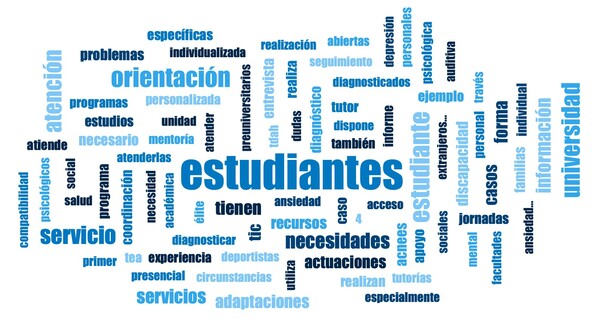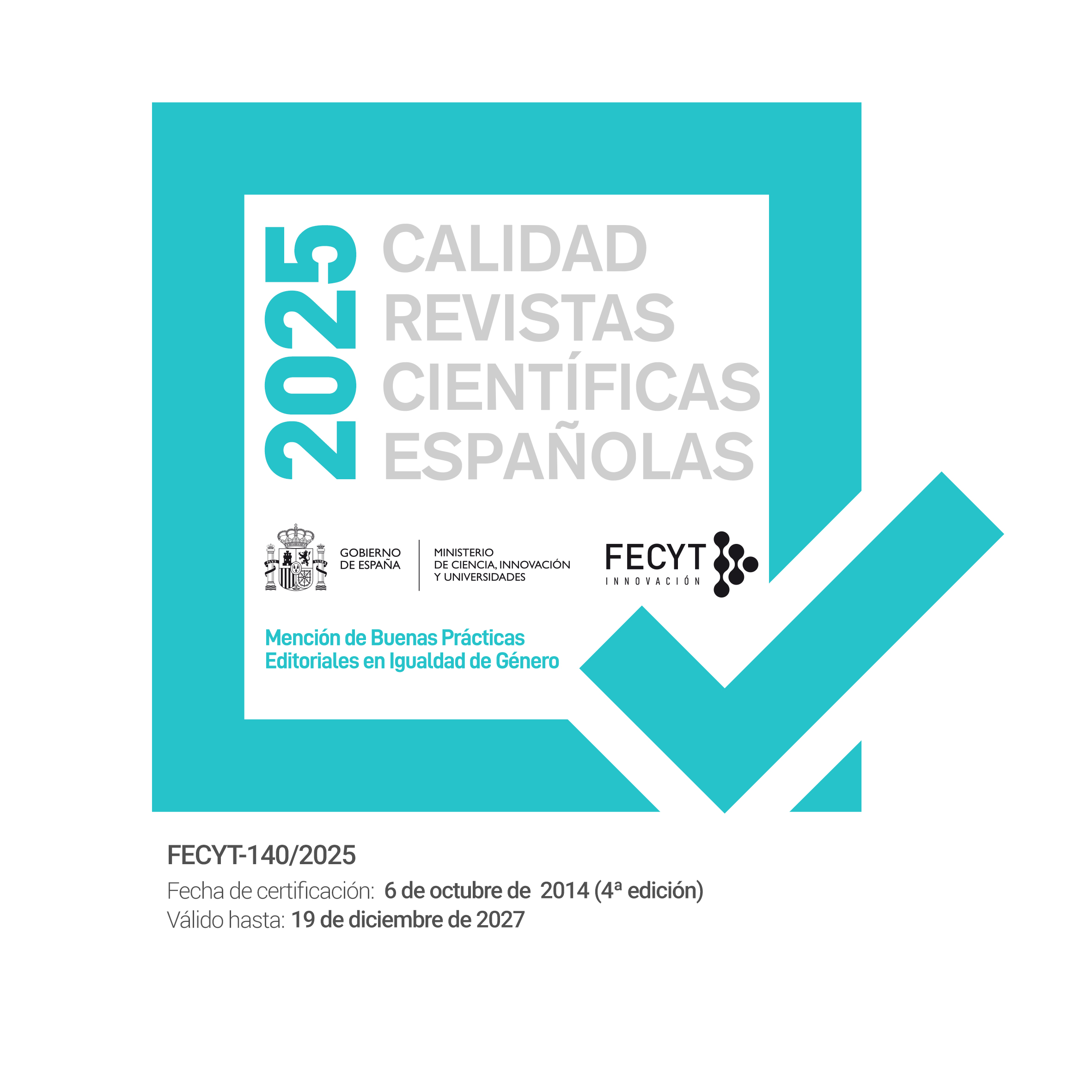Actuaciones de orientación universitaria vinculadas a la diversidad del estudiantado
DOI:
https://doi.org/10.5944/educxx1.38613Palabras clave:
orientación, universidad, servicio de orientación, mentoría, tutoría, características individuales, salud mental, TICResumen
Los servicios de orientación universitaria han ganado importancia debido a las transformaciones que se han producido a nivel legislativo y la necesidad de atender a un perfil de estudiante cada vez más diverso. Las universidades deben proporcionar atención individual para promover éxito académico y bienestar estudiantil. Estas actuaciones son fundamentales para atender a estudiantes de atención a la diversidad, como discapacidad o trastornos, siendo necesaria la intervención de personal especializado. El objetivo de este estudio ha sido conocer las iniciativas de atención individual que se realizan en las universidades públicas españolas. Para ello, se ha realizado un análisis de contenido, seleccionándose la muestra mediante un muestreo polietápico. La muestra final de este estudio ha sido un total de 34 entrevistas a 41 expertos de los servicios de orientación, 5 realizadas de forma conjunta porque había más de un experto en el servicio, y 29 individuales, de n=26 universidades públicas. La técnica de recogida de información fue la entrevista semiestructurada, que se analizaron con el programa MAXQDA 2022. Los resultados
muestran que las intervenciones de orientación individual se desarrollan principalmente mediante servicios específicos, como los de atención psicológica. También se destaca la generalización de la tutoría como iniciativa institucional para atender individualmente a los estudiantes, en la que el profesor-tutor tiene un papel fundamental. Se han extendido en las universidades las actuaciones destinadas a la atención del estudiantado de atención a la diversidad mediante entrevistas o adaptaciones no significativas. Las universidades públicas españolas realizan actuaciones de apoyo y orientación al estudiantado de forma individualizada, siendo un modelo de orientación centrado en el desarrollo integral del estudiante basado en el modelo de orientación counselling. La atención a estudiantes con discapacidad o trastornos del neurodesarrollo están más extendidas frente a otra diversidad estudiantil, pudiendo ser adecuado avanzar en el desarrollo de estas actuaciones.
Descargas
Citas
Álvarez-Pérez, P. R., González-Benítez, N., & López-Aguilar, D. (2023). Perspectivas y retos de una universidad inclusiva desde un enfoque psicopedagógico. Revista Costarricense de Orientación, 2(2). https://doi.org/10.54413/rco.v2i2.34
Alulima, M. S. L. D., & Chiluisa, L. M. M. (2022). Intellectual disability students’ learning in higher education. Journal of Positive Psychology and Wellbeing, 6(1), 1788-1797
Biasi, V., Patrizi, N., De Vincenzo, C., & Mosca, M. (2017). I colloqui di orientamento per facilitare il successo accademico: una indagine sperimentale. Journal of
Educational, Cultural and Psychological Studies, 1(15), 215-228. http://dx.doi.org/10.7358/ecps-2017-015-bias
Bishop, J. B. (2016). A wish list for the advancement of university and college counseling centers. Journal of College Student Psychotherapy, 30(1), 15-22. https://doi.org/10.1080/87568225.2016.1105651
Cardinot, A., & Flynn, P. (2022). Rapid evidence assessment: mentoring interventions for/by students with disabilities at third-level education. Education Sciences, 12(6), 384. https://doi.org/10.3390/educsci12060384
Clancey, W. J., & Hoffman, R. R. (2021). Methods and standards for research on explainable artificial intelligence: lessons from intelligent tutoring systems. Applied AI Letters, 2(4), 1-8. https://doi.org/10.1002/ail2.53
Cohen, L., Lawrence, M., & Morrison, K. (2018). Research Methods in Education. Routledge.
Cotán, A., Aguirre, A., Morgado, B., & Melero, N. (2021). Methodological strategies of faculty members: moving toward inclusive pedagogy in higher education. Sustainability, 13(6), Artículo 3031. https://doi.org/10.3390/su13063031
Davis, M. T., Watts, G. W., & López, E. J. (2021). A systematic review of firsthand experiences and supports for students with autism spectrum disorder in higher education. Research in Autism Spectrum Disorders, 84, Artículo 101769. https://doi.org/10.1016/j.rasd.2021.101769
Dessauvagie, A. S., Dang, H. M., Nguyen, T. A. T., & Groen, G. (2022). Mental health of university students in southeastern Asia: a systematic review. Asia Pacific Journal of Public Health, 34(2-3), 172-181. https://doi.org/10.1177/10105395211055545
Dunajeva, J. (2023). University mentoring programs during the pandemic: case study of Hungarian Roma university students. Social Sciences, 12(3), 111. https://doi.org/10.3390/socsci12030111
Ehlers, U. -D. (2020). Future skills for a European higher education. En S. Noorda, P. Scoot & M. Vukasovic (Eds.), Bologna Process Beyond (pp. 311-324). Bononia University Press.
European Commission (2 de febrero de 2022). Eurydice. https://bit.ly/4ahYCAL
Garzuzi, V. (2019). La orientación educativa universitaria: desafíos actuales en la Educación Superior. En la Mira. La Educación Superior en Debate, 1(1), 11-25. https://bit.ly/49aqt4A
Güvendir, M. A. (2018). The relation of an international student center’s orientation training sessions with international students’ achievement and integration to university. Journal of International Students, 8(2), 843-860. https://dx.doi.org/10.5281/zenodo.1250385
Hyun, J., Quinn, B., Madon, T., & Lustig, S. (2007). Mental health need, awareness, and use of counseling services among international graduate students. Journal of American College Health, 56(2), 109-118.
Infenthaler, D., & Yau, J. Y. K. (2020). Utilising learning analytics to support study success in higher education: a systematic review. Educational Technology Research and Development, 1-30. https://doi.org/10.1007/s11423-020-09788-z
Inglis, B., & Cathcart, K. (2018). Online counselling in Australian and New Zeland and noordand universities. JANZSSA-Journal of the Australian and New Zealand Student Services Association, 26(2), 99-112.
Jang, K., Canggra, B. B., Moradi, S., Riordan, B. C., Chan, J., Hunter, J., & Scarf, D. (2019). Mental health at university: a social identity approach. En D. Esteves, D. Scarf, P. Pinheiro, H. Arahanga-Doyle, & J. Hunter (Eds.), Global perspectives on university students (pp. 27-46). Nova Science Pub Inc.
Kettune, J., Lindberg, M., Nygaard, E., & Kárdal, J. (2020). Enhancing career practitioners’ understanding and use of ICT in guidance and counselling. En E. Hagaseth, T. Hooley, J., Kettunen, & R. Thomsen (Eds.), Career and career guidance in the Nordic Countries (pp. 163–175). https://doi.org/10.1163/9789004428096_011
Kindelan, P. (2021). Coming to grips with Bologna: change and student empowerment in transforming classes into an effective learning environment. Review of European Studies, 13(3), 43. https://doi.org/10.5539/res.v13n3p43
Klafke, R., de Oliveira, M. C. V., & Ferreira, J. M. (2020). The good professor: a comparison between public and private universities. Journal of Education, 200(1), 62-70. https://doi.org/10.1177/0022057419875124
Klug, M. A., & Peralta, N. S. (2019). Tutorías universitarias. Percepciones de estudiantes y personal tutor sobre su uso y funcionamiento. Revista Electrónica Educare, 23(1), 319-341. http://dx.doi.org/10.15359/ree.23-1.16
Ley Orgánica 2/2023, de 22 de marzo, del Sistema Universitario. Boletín Oficial del Estado, 70, de 23 de marzo de 2023. https://bit.ly/3vswR9z
Locke, J., Osuna, A., Myrvold, R. J., & Closson, J. S. (2023). Supporting autistic college students: examining the Mentoring, Organization and Social Support for Autism Inclusion on Campus (MOSSAIC) Program. Journal of Autism and Developmental Disorders, 1-14. https://doi.org/10.1007/s10803-023-05969-w
López-Gómez, E., Leví-Orta, G., Medina Rivilla, A., & Ramos-Méndez, E. (2020). Dimensions of university tutoring: a psychometric study. Journal of Further and Higher Education, 44(5), 609-627. https://doi.org/10.1080/0309877X.2019.1571174
Lorenzo-Lledó, G., Carreres, A. L., Lledó, A. L., & Vera, G. A. (2017). La acción tutorial como acompañamiento en el alumnado universitario con discapacidad: hacia una educación inclusiva. Revista INFAD de Psicología. International Journal of Developmental and Educational Psychology, 4(1), 137-144. https://doi.org/10.17060/ijodaep.2017.n1.v4.1036
Maldonado, E. P. (2018). Competencias del profesorado universitario para la atención a la diversidad en la educación superior. Revista Latinoamericana de Educación Inclusiva, 12(2), 115-131. http://dx.doi.org/10.4067/S0718-73782018000200115
Manson, H. D. (2021) Grit and its relation to well-being among first year South African university students. Journal of Psychology in Africa, 31(3), 226-231. https://doi.org/10.1080/14330237.2021.1903157
Martínez Clares, P., Pérez Cusó, F. J., & González Morga, N. (2019). ¿Qué necesita el alumnado de la tutoría universitaria? Validación de un instrumento de medida a través de un análisis multivariante. Educación XX1, 22(1), 189-213. https://doi.org/10.5944/educxx1.21302
Pantoja-Vallejo, A., Molero, D., Molina-Jaén, M. D., & Colmenero-Ruiz, M. J. (2020). Valoración de la práctica orientadora y tutorial en la universidad: validación de una escala para el alumnado. Educación XX1, 23(2), 119-143. https://doi.org/10.5944/educXX1.25632
Radlick, R. L., & Mevatne, M. (2023). Mentoring for inclusion: a scoping review of the literature. Nordisk Välfärdsforskning| Nordic Welfare Research, 8(1), 65-79. https://doi.org/10.18261/nwr.8.1.6
Real Decreto 1791/2010, por el que se aprueba el Estatuto del Estudiante Universitario. Boletín Oficial del Estado, 318, de 1 de enero de 2011. https://bit.ly/4aelzoj
Sanagavarapu, P., & Abraham, J. (2020). Validating the relationship between beginning students’ transitional challenges, well-being, help-seeking, and their adjustments in an Australian university. Journal of Further and Higher Education, 45(5), 616-628. https://doi.org/10.1080/0309877X.2020.1804537
Stanwood, J., & Mittiga, A. (2022). Faculty attitudes toward inclusive instruction: then and now. New Directions for Teaching and Learning, 2022(172), 79-92. https://doi.org/10.1002/tl.20527
Suárez Lantarón, B., Castillo Reche, I. S., & López Medialdea, A. (2021). Tutoría académica universitaria apoyada mediante WhatsApp: conocer sus ventajas y salvar sus desventajas. Revista Electrónica Interuniversitaria de Formación del Profesorado, 24(1), 189-203. https://doi.org/10.6018/reifop.394631
Tindle, R., Castillo, P., Doring, N., Grant, L., & Willis, R. (2022). Developing and validating a university needs instrument to measure the psychosocial needs of university students. British Journal of Educational Psychology, 92(4), 1550-1570. https://doi.org/10.1111/bjep.12515
Tuero, E., Cervero, A., Esteban, M., & Bernardo, A. (2018). ¿Por qué abandonan los alumnos universitarios? Variables de influencia en el planteamiento y consolidación del abandono. Educación XX1, 21(2), 131-154. https://dx.doi.org/10.5944/educXX1.20066
Watts, A. G. (2001). The role of information and communication technologies in an integrated career information and guidance system. Organization for Economic Co-operation and Development.
Zorec, K., Desmond, D., Boland, T., McNicholl, A., O’Connor, A., Stafford, G., & Gallagher, P. (2022). A whole-campus approach to technology and inclusion of students with disabilities in higher education in Ireland. Disability & Society, 1-26. https://doi.org/10.1080/09687599.2022.2114885

Descargas
Publicado
Cómo citar
Número
Sección
Licencia
Derechos de autor 2024 Yaiza Viñuela, Diego González-Rodríguez, Javier Vidal

Esta obra está bajo una licencia internacional Creative Commons Atribución-NoComercial 4.0.
La revista Educación XX1 se publica bajo licencia Creative Commons Reconocimiento-NoComerciaL 4.0 (CC BY-NC 4.0). Se permite la generación de obras derivadas siempre que no se haga un uso comercial. Tampoco se puede utilizar la obra original con finalidades comerciales.










